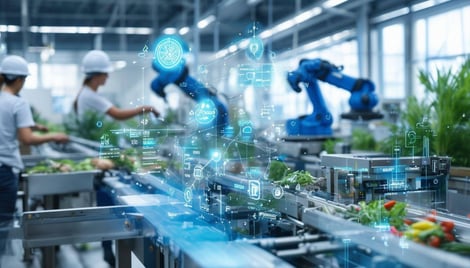
Harnessing the Power of IoT in Food and Beverage Manufacturing Systems: A Focus on PlanetTogether Integration
As consumer expectations for quality, safety, and sustainability grow, manufacturers are turning to cutting-edge technologies like the Internet of Things (IoT) to stay competitive. For Manufacturing IT Managers, the integration of IoT into existing systems is a game-changer, offering unparalleled opportunities for efficiency, traceability, and data-driven decision-making. But how can IoT be effectively integrated into manufacturing operations, and what role does software like PlanetTogether play when combined with enterprise systems like SAP, Oracle, Microsoft, Kinaxis, or Aveva?
This blog explores how IoT transforms food and beverage manufacturing and highlights the strategic value of integrating IoT data with advanced planning and scheduling tools, such as PlanetTogether.
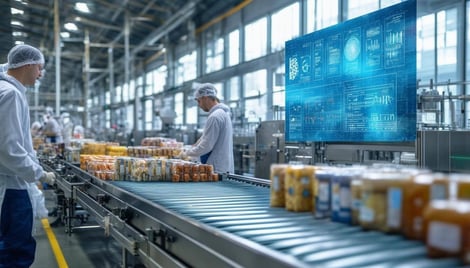
IoT in Food and Beverage Manufacturing: An Overview
IoT, often described as a network of interconnected devices, sensors, and systems, has emerged as a cornerstone of smart manufacturing. In the food and beverage industry, IoT-enabled devices capture real-time data from every stage of the production process, from raw material intake to final product packaging.
Key applications include:
Quality Control: Sensors monitor temperature, humidity, and other critical parameters to ensure compliance with safety standards.
Predictive Maintenance: IoT devices detect equipment anomalies, minimizing downtime and extending machinery life.
Energy Efficiency: Smart systems optimize energy consumption, aligning with sustainability goals.
Supply Chain Visibility: Real-time tracking enables better inventory management and reduces waste.
While the benefits of IoT are undeniable, the real value lies in how this data is utilized—and this is where integration with systems like PlanetTogether and ERP platforms comes into play.
![]()
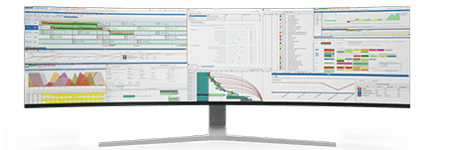
The Role of PlanetTogether in IoT-Driven Manufacturing
PlanetTogether Advanced Planning and Scheduling (APS) software is designed to optimize production schedules by aligning resources, labor, and materials. By integrating IoT data into PlanetTogether, manufacturing IT managers can unlock new levels of efficiency and agility.
Real-Time Decision-Making
IoT devices continuously feed data into systems like PlanetTogether, providing a dynamic view of production. For example:
Equipment Monitoring: IoT sensors detect an impending machine failure. This data is instantly relayed to PlanetTogether, which reschedules production to avoid delays.
Inventory Levels: Real-time stock data allows the system to adjust schedules proactively, ensuring material shortages do not disrupt operations.
Enhanced Traceability and Compliance
In food and beverage manufacturing, traceability is critical. Integrating IoT with PlanetTogether and ERP systems like SAP or Oracle ensures compliance with industry standards. For instance:
Lot Tracking: IoT-enabled barcode scanners track ingredients through every production stage. PlanetTogether uses this data to generate reports that satisfy regulatory requirements.
Automated Alerts: If a sensor detects a deviation in temperature during storage, the system triggers an alert, preventing compromised products from reaching consumers.
Energy and Resource Optimization
Energy consumption is a significant cost driver in manufacturing. IoT devices monitor energy usage, and PlanetTogether leverages this data to create energy-efficient schedules. When integrated with sustainability-focused platforms like Aveva, manufacturers can achieve their decarbonization goals more effectively.
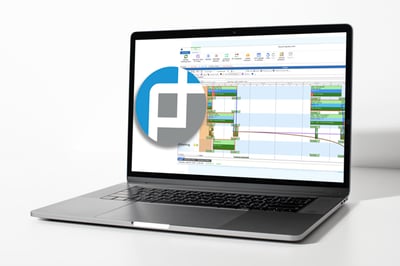
Integration with Leading Enterprise Systems
The true potential of IoT in food and beverage manufacturing is realized when it seamlessly integrates with enterprise systems. Here’s how PlanetTogether interacts with leading platforms:
SAP
SAP’s ERP solutions are renowned for their robust data management capabilities. Integrating PlanetTogether with SAP allows:
Centralized Data Access: IoT data flows into SAP, creating a unified source of truth for production planning.
Dynamic Scheduling: PlanetTogether’s APS capabilities enhance SAP’s core functionality, enabling real-time adjustments based on IoT insights.
Oracle
Oracle’s cloud-based solutions offer scalability and advanced analytics. When paired with PlanetTogether:
Predictive Analytics: IoT and Oracle’s AI tools identify patterns, which PlanetTogether uses to optimize production schedules.
Supply Chain Coordination: Oracle’s logistics solutions integrate with PlanetTogether to align production with distribution demands.
Microsoft
Microsoft’s Azure IoT suite provides a robust platform for data collection and analysis. Integration benefits include:
Cloud-Based Operations: IoT data stored in Azure integrates with PlanetTogether for seamless production planning.
Enhanced Collaboration: Microsoft Teams and Power BI enable cross-functional teams to analyze IoT-driven insights.
Kinaxis
Kinaxis’ RapidResponse platform focuses on supply chain agility. Combined with PlanetTogether:
Scenario Planning: IoT data feeds into Kinaxis to model supply chain disruptions, with PlanetTogether adjusting production accordingly.
End-to-End Visibility: From raw materials to finished goods, IoT enhances visibility across the entire value chain.
Aveva
Aveva’s focus on sustainability and energy management complements PlanetTogether’s scheduling capabilities:
Sustainability Metrics: IoT data on energy usage integrates with Aveva to track carbon footprints, while PlanetTogether ensures resource-efficient schedules.
Holistic Optimization: Combining Aveva’s visualization tools with PlanetTogether’s APS creates a comprehensive view of operational performance.
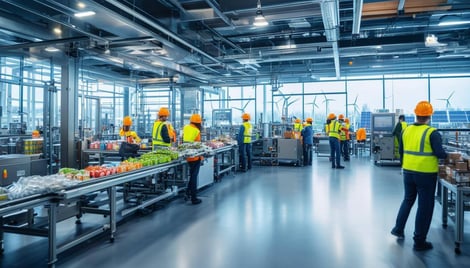
The Future of IoT in Food and Beverage Manufacturing
The integration of IoT with advanced planning and scheduling systems like PlanetTogether marks the beginning of a new era in food and beverage manufacturing. As technology continues to evolve, IoT will enable:
AI-Driven Insights: Machine learning algorithms will analyze IoT data, offering predictive recommendations for production planning.
Autonomous Operations: IoT and robotics will enable fully automated manufacturing lines, reducing human intervention.
Sustainable Manufacturing: IoT will play a key role in achieving zero-waste goals, aligning with consumer demand for eco-friendly products.
For Manufacturing IT Managers, staying ahead of these trends is essential. By leveraging IoT and integrating it with platforms like PlanetTogether and enterprise systems, manufacturers can drive innovation, ensure compliance, and achieve operational excellence.
The Internet of Things is reshaping the food and beverage manufacturing industry, offering unprecedented opportunities for efficiency and innovation. However, the real value of IoT lies in its integration with advanced planning tools like PlanetTogether and robust ERP systems such as SAP, Oracle, Microsoft, Kinaxis, and Aveva. For Manufacturing IT Managers, the challenge is to bridge the gap between IoT data and actionable insights, ensuring that every byte of information contributes to smarter, more sustainable operations.
As you embark on this journey, remember that success lies in strategic integration, a clear focus on ROI, and a commitment to continuous improvement. The future of food and beverage manufacturing is connected, intelligent, and efficient—and IoT is leading the way.
Are you ready to take your manufacturing operations to the next level? Contact us today to learn more about how PlanetTogether can help you achieve your goals and drive success in your industry.
Topics: PlanetTogether Software, Integrating PlanetTogether, Real-Time Decision-Making, Enhanced Traceability and Compliance, Food and Beverage Manufacturing, Energy and Resource Optimization




















LEAVE A COMMENT